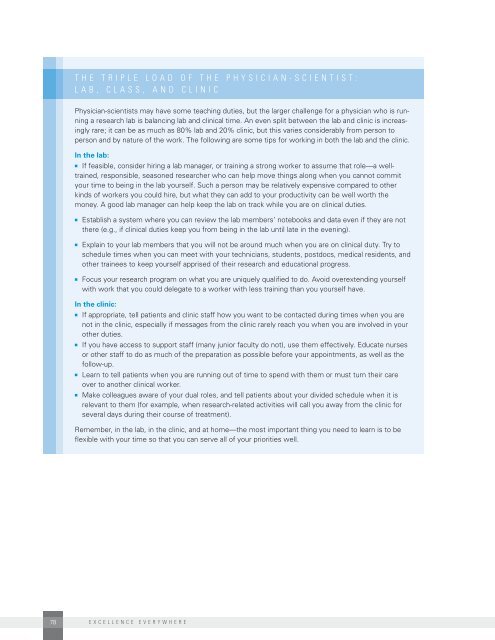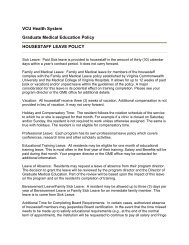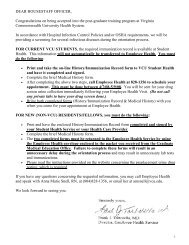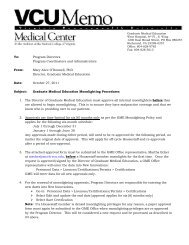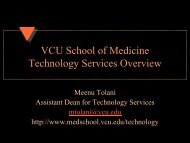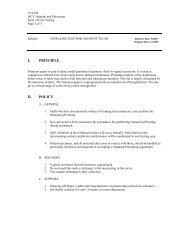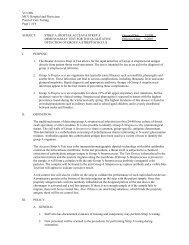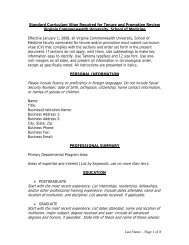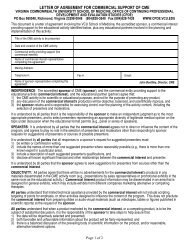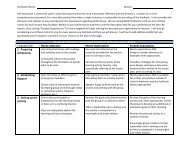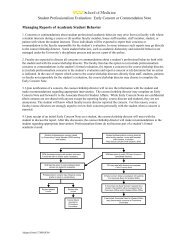T h e T r i p l e L o a d o f t h e P h y s i c i a n - S c i e n t i s t :L a b , C l a s s , a n d C l i n i cPhysician-scientists may have some teaching duties, but the larger challenge for a physician who is runninga research lab is balancing lab and clinical time. An even split between the lab and clinic is increasinglyrare; it can be as much as 80% lab and 20% clinic, but this varies considerably from person toperson and by nature <strong>of</strong> the work. The following are some tips for working in both the lab and the clinic.In the lab:n If feasible, consider hiring a lab manager, or training a strong worker to assume that role—a welltrained,responsible, seasoned researcher who can help move things along when you cannot commityour time to being in the lab yourself. Such a person may be relatively expensive compared to otherkinds <strong>of</strong> workers you could hire, but what they can add to your productivity can be well worth themoney. A good lab manager can help keep the lab on track while you are on clinical duties.n Establish a system where you can review the lab members’ notebooks and data even if they are notthere (e.g., if clinical duties keep you from being in the lab until late in the evening).n Explain to your lab members that you will not be around much when you are on clinical duty. Try toschedule times when you can meet with your technicians, students, postdocs, medical residents, andother trainees to keep yourself apprised <strong>of</strong> their research and educational progress.n Focus your research program on what you are uniquely qualified to do. Avoid overextending yourselfwith work that you could delegate to a worker with less training than you yourself have.In the clinic:n If appropriate, tell patients and clinic staff how you want to be contacted during times when you arenot in the clinic, especially if messages from the clinic rarely reach you when you are involved in yourother duties.n If you have access to support staff (many junior faculty do not), use them effectively. Educate nursesor other staff to do as much <strong>of</strong> the preparation as possible before your appointments, as well as thefollow-up.n Learn to tell patients when you are running out <strong>of</strong> time to spend with them or must turn their careover to another clinical worker.n Make colleagues aware <strong>of</strong> your dual roles, and tell patients about your divided schedule when it isrelevant to them (for example, when research-related activities will call you away from the clinic forseveral days during their course <strong>of</strong> treatment).Remember, in the lab, in the clinic, and at home—the most important thing you need to learn is to beflexible with your time so that you can serve all <strong>of</strong> your priorities well.78 excellence everywhere
FAMILY MATTERSMany scientists face great demands from theirextended families and communities. Althoughthese demands matter and these relationshipsare centrally important, to be successful at anypr<strong>of</strong>ession one may need to find ways to containand manage the time involved.The issues can be practical—how can you be intwo places at one time? But they can also be veryemotional. If it has always been a tradition thatyou will go home to family to help prepare for aholiday or a change <strong>of</strong> seasons or to help with aharvest, deciding to make another use <strong>of</strong> yourtime, or to come in only for the feast and leavethe work to others, is not easy. It is even harderwhen you consider that your parents, siblings,in-laws, cousins, aunts, uncles, and neighbors willall have an opinion and will likely express it! This isa matter that is very specific to your own life, butit is also universal. There are no perfect solutions.But you can try to separate the practical aspects<strong>of</strong> the situation (for example, what work requiresone more set <strong>of</strong> hands, and can you provide somehelp without providing your own hands?) from theemotional ones such as the perception that youcare more about your career and what it gives youthan about the people who love you, or that youhave gotten “above yourself,” or that you lookdown on those who make your life possible.Home and Work:Can You Have It All?This question applies to many pr<strong>of</strong>essionals inhigh-pressure careers, including both male andfemale scientists pursuing academic, government,institutional, and industrial career tracks.It helps to start with a supportive partner andfamily. Have clear discussions about career andpersonal goals—yours and those <strong>of</strong> your family—early on. To avoid the resentments <strong>of</strong> unspokenand unmet expectations, be as explicit as possibleabout your aspirations with those who are importantto you. Shared goals for work and family makecompromises easier. In some families, your careerwill be a primary driver <strong>of</strong> your family’s future.For others, both spouses may have pr<strong>of</strong>essionalIn Sierra Leone and Papua New Guinea,where peer group discussions are the biggestpastime activities, rumors are rife. People donot believe in innocent relationships betweenmen and women and working at night isalways suspicious. Attending meetings/workshopsin hotels with staff members easilycreates stories. To ensure a happy home lifeand avoid confusion regarding after-hours labwork, meetings, and international travel, Itreat my lab staff and their families as one bigextended family. Spouses are encouraged toattend seminars. They are educated about theneed for working late at night and attendingmeetings. Selection criteria for internationalmeetings and other perceived privileges aremade clear to everybody, including familymembers. I have learnt that once your familytrusts your relationship with your workmatesand students, other family issues will be easyto manage.”Moses Bockarie, Papua New Guineaneeds to fulfill. Whatever your situation, it is probablytrue that if your family understands what youare doing, why it matters, and how it will improvethe family’s future, things at home will go betterthan if everyone is kept in the dark about things.In addition to sharing your long-term goals, keepyour family aware <strong>of</strong> your short-term plans andprojects. Letting them know in advance about animpending grant deadline can buy some understanding.Here are some ways to keep your familyinformed <strong>of</strong> your schedule, and keep you involvedwith your family:n Post a calendar at home with your travel datesand big deadlines.n Schedule activities with your family and keepthose commitmentsn Turn business travel into a vacation. Have yourpartner or family join you after a scientific meetingand take a few days together to unwind.managing your time79
- Page 3 and 4:
A R e s o u r c e f o r S c i e n t
- Page 5 and 6:
Table of ContentsVII119PrefaceChapt
- Page 7:
135 Chapter 10E x p a n d i n g Y o
- Page 15 and 16:
Q u e s t i o nq&aWhat Is a “Tenu
- Page 17:
preparing for immediate submission,
- Page 22 and 23:
Practicing the Talkn Practice your
- Page 24 and 25:
your one-on-one interviews you have
- Page 26 and 27:
If talking directly about money is
- Page 28 and 29:
When the institution responds and y
- Page 30 and 31:
equipment and supplies. Maintenance
- Page 32 and 33:
Q u e s t i o nq&aIs your instituti
- Page 34 and 35:
Working With Human SubjectsWhether
- Page 36 and 37:
RESPONSIBILITIES BEYONDTHE LABORATO
- Page 38 and 39: UNDERSTANDING YOURINSTITUTION AND H
- Page 40: Criteria for PromotionStructure of
- Page 45 and 46: Q u e s t i o nWhat’s in a Name?q
- Page 47 and 48: Screening ApplicantsWhen you review
- Page 50 and 51: Interpersonal Skillsn How important
- Page 52 and 53: Multinational Organizations are hir
- Page 54 and 55: n If there is an office that handle
- Page 57 and 58: n Seek funding and publish papers (
- Page 59 and 60: In fact, even though you yourself h
- Page 61 and 62: n Craft a statement that you feel c
- Page 63 and 64: n When you delegate authority to so
- Page 65 and 66: n Use only pens, preferably with wa
- Page 67 and 68: Strategy sessionsShould you decide
- Page 69 and 70: Finding Good Papers for Journal Clu
- Page 71 and 72: If possible, invite people in your
- Page 73 and 74: Q u e s t i o nq&aHow do I avoid po
- Page 75 and 76: The International Committee of Medi
- Page 77 and 78: Managing Conflictin the LabConflict
- Page 79 and 80: steps for dealing with conflictWhen
- Page 81 and 82: chapter 5managing your time“ Succ
- Page 83 and 84: Check your work: the 90-year though
- Page 85 and 86: n Make and keep appointments with y
- Page 87: n Help them seek advice without tak
- Page 91 and 92: chapter 6project management“ We m
- Page 93 and 94: My project is to get a grant funded
- Page 95: ObjectivesObjectives are the end re
- Page 98 and 99: The key events schedule and the act
- Page 100 and 101: Microsoft Project, a program that s
- Page 102 and 103: Martin, Vivien. Managing Projects i
- Page 104 and 105: appendix II: Example of a Work Brea
- Page 106 and 107: appendix iv: Example of a Gantt Cha
- Page 108 and 109: e h i n d c l o s e d d o o r s :w
- Page 110 and 111: Who might be interested in supporti
- Page 112 and 113: Call your program officerProgram of
- Page 114 and 115: direct costs vs. indirect costsDire
- Page 116 and 117: RESOURCESAllen, Ernest M. “Why ar
- Page 118 and 119: the next generation of students (th
- Page 120 and 121: Seek Feedback through a Formal Peer
- Page 122 and 123: Encouraging Student Questionsn Do n
- Page 124 and 125: Here are some ways you can help the
- Page 126 and 127: n Are there curriculum changes unde
- Page 128 and 129: a relaxed format for talking about
- Page 130 and 131: spend in preparing an effective cou
- Page 132 and 133: The Publishing ProcessTypes of Jour
- Page 134 and 135: A word about impact factorsThe impa
- Page 136 and 137: C r e a t i n g a n i n t e g r a t
- Page 138 and 139:
may need to take the first author p
- Page 140 and 141:
submitting image filesToday, most i
- Page 142 and 143:
Submitting your Paper to Another Jo
- Page 144 and 145:
RESOURCESDavis, Martha. Scientific
- Page 146 and 147:
increase your impact as a scientist
- Page 148 and 149:
Q u e s t i o nq&aHow do I communic
- Page 150 and 151:
n Offer criticism and correction in
- Page 152 and 153:
It is important to discuss career g
- Page 154 and 155:
When Mentoring,Advisory, or Supervi
- Page 156 and 157:
For researchers in developing count
- Page 158 and 159:
n Is travel safe and convenient, or
- Page 160 and 161:
n The expected contribution of each
- Page 162 and 163:
Meetings. Set up systems to ensure
- Page 164 and 165:
SPECIAL CHALLENGESFOR THE BEGINNING
- Page 166 and 167:
e an important connection to future
- Page 168 and 169:
The invention of a new method or pr
- Page 170 and 171:
licensee, who can charge others for
- Page 172 and 173:
Most profound for developing countr
- Page 174 and 175:
Finally, the patents have been chal
- Page 176 and 177:
And, India benefited as a supplier
- Page 178 and 179:
paperwork involved in purchasing1.
- Page 180 and 181:
labeling mattersA case in point: In
- Page 182 and 183:
equipment, freeze-drying equipment,
- Page 184 and 185:
Responsibilityfor materialsIf an or
- Page 186 and 187:
Recent Improvementsin Materials Tra
- Page 188 and 189:
“Knowledge is power.” —Sir Fr
- Page 190 and 191:
MOUMemorandum of UnderstandingRFPRe
- Page 192 and 193:
notes continued182 excellence every
- Page 194:
notes continued184 excellence every


